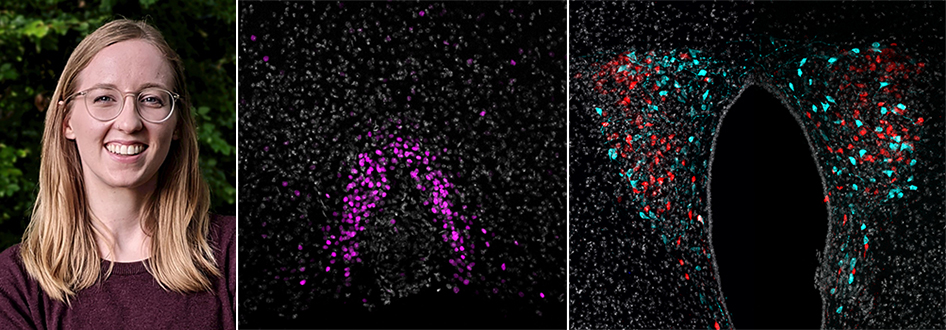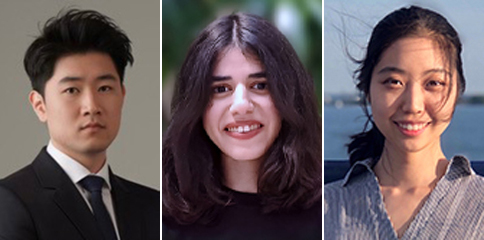
Breadcrumb
- News and Events
- News
- Content
- Major funding awards for seven RI-MUHC trainees
null Major funding awards for seven RI-MUHC trainees
A Banting Fellowship and six Vanier Scholarships were awarded in 2024
Source: CIHR, RI-MUHC and McGill University
July 3, 2024
Six graduate students from the Research Institute of the McGill University Health Centre (RI-MUHC) are among the 16 from McGill University to win the prestigious 2024 Vanier Canada Graduate Scholarships, the federal government’s program recognizing doctoral research excellence, while a postdoctoral trainee in the Brain Repair and Integrative Neuroscience (BRaIN) Program is one of four McGill recipients of a Banting Postdoctoral Fellowship.

The Honourable François-Philippe Champagne, Canada’s Minister of Innovation, Science and Industry, and the Honourable Mark Holland, Minister of Health, announced the winners on May 29. “Their dedication to advancing knowledge for the benefit of all is truly impressive and their hard work will help find solutions that have the potential to make the world a better place and drive Canadian prosperity,” said Minister Champagne.
The competition results reflect the exceptional training environment at the RI-MUHC, according to Dr. Rhian Touyz, its Executive Director and Chief Scientific Officer. “I warmly congratulate each of our 2024 Vanier Scholars and our new Banting Postdoctoral Fellow,” she said. “The range of ambitious research projects that they have undertaken is truly inspiring for all of our trainees. In the spirit of team science, I am also happy that our affiliations with the Rosalind and Morris Goodman Cancer Institute and The Neuro are contributing to the success of RI-MUHC trainees at the highest levels of competition in the country.”
Banting Postdoctoral Fellow – Mary LaPierre, PhD, Neuroscience
Supervisor: Charles Bourque, PhD, BRaIN Program
Project: A neural basis for the coordinated control of thermal and osmotic homeostasis

Mary LaPierre’s research examines the mechanistic processes by which the brain integrates environmental signals to orchestrate homeostatic processes. As a postdoctoral fellow with Professor Charles Bourque, Mary is working to identify the “sensor” neurons that detect heat and dehydration, and how they communicate with “effector” neurons to control responses such as thermogenesis, feeding behaviour, sodium appetite, and diuresis.
The middle image above shows “sensor” neurons located in the organum vasculosum lamina terminalis (OVLT). These neurons are identified by their expression of c-Fos (an indicator of neuron activation; in magenta) in response to a hyperosmotic stimulus. Cell nuclei are in grey. The image at right shows some of the “effector” neurons located in the paraventricular nucleus of the hypothalamus (PVN): vasopressin-producing neurons (in red) and oxytocin-producing neurons (in cyan). Cell nuclei are in grey.
Vanier Canada Graduate Scholarship recipients

Jae Hyun Byun, Experimental Medicine
Supervisor: Dr. Stella Daskalopoulou, Cardiovascular Health across the Lifespan (CHAL) Program
Project: Identifying the role of sex hormones in carotid atherosclerotic plaque instability
Cardiovascular disease (CVD) is the leading cause of death and disability worldwide. A major driver of CVD is atherosclerosis, which involves the build-up of fats in major arteries forming what is known as plaque. My research explores how sex hormones might influence differences in atherosclerotic plaque instability, identifying potential markers that relate to sex-specific plaque phenotypes for better stroke risk prediction and management in both men and women.
Nour Chahine, Neuroscience
Supervisor: Adrien Peyrache, PhD, BRaIN Program, RI-MUHC/The Neuro
Project: Circuit-behaviour analysis of Fragile X ASD/ID rat model through the head-direction system
My project explores the origins of autism spectrum disorders and intellectual disabilities (ASD/ID). Despite known genetic and cellular links, how these factors cause cognitive deficiencies remains unclear. My research aims to understand circuit-level irregularities in the Fragile X Syndrome rat model, guiding new animal model evaluations and potential intervention tests, ultimately aiming for effective ASD/ID treatments.
Judy Chen, Neuroscience
Supervisor: Boris Bernhardt, PhD, BRaIN Program, RI-MUHC/The Neuro
Project: Towards lifespan approaches for epilepsy biomarker discovery and validation.

Jamie Magrill, Human Genetics
Supervisor: Ian Watson, PhD, Cancer Research Program, RI-MUHC/Rosalind and Morris Goodman Cancer Institute
Project: Identification of biomarkers using single-cell technology that inform on targeted and immune therapy treatment in melanoma
This research investigates the role of the tumour microenvironment in patient response to melanoma immunotherapy and targeted therapy, applying and adapting cutting-edge spatial-transcriptomics technologies to search for and validate biomarkers of treatment response, with the goal of improving therapy outcomes for metastatic melanoma patients.
Tarek Taifour, Experimental Medicine
Supervisor: William J. Muller, PhD, BRaIN Program, RI-MUHC/ Rosalind and Morris Goodman Cancer Institute
Project: Investigating the role of Chi3l1 in non-small cell lung cancer progression and resistance to immunotherapies
Immunotherapies, agents that harness the patients’ immune system to fight tumours, are often used to treat lung cancers but have limited success. Improving response to immunotherapies requires an understanding of how cancers suppress the immune system. Recent data from our lab suggest that this may occur through a protein called Chitinase-3 like 1 (Chi3l1). In this project, we will use preclinical models to investigate the role of Chi3l1 in lung cancer and evaluate its utility as a therapeutic target that can improve response to immunotherapies.
Raffles Xingqi Zhu, Neuroscience
Supervisor: Robert Hess, PhD, BRaIN Program
Project: Investigating the internal spatial noise in normal and amblyopic vision using an equivalent noise paradigm
The world we see seems so sharp, yet this perception is a construct of the underlying physiology that is subject to noise of all kinds. My doctoral research aims to understand how positional internal spatial noise limits object recognition in normal and amblyopic vision using psychophysical and modern machine learning approaches.
____________________________________________________________________________
Across Canada, Vanier scholarships were awarded to 166 doctoral candidates and 70 postdoctoral researchers received Banting fellowships. The programs are funded by the Canadian Institutes of Health Research (CIHR), the Natural Sciences and Engineering Research Council of Canada, and the Social Sciences and Humanities Research Council of Canada.
Related news
Celebrating excellence in Canadian research: Announcing recipients of the Vanier Canada Graduate Scholarships and the Banting Postdoctoral Fellowships
McGill doctoral and postdoctoral students earn major funding awards (McGill Reporter)